- Home
- J. -H. Rosny aîné
The World of the Variants Page 12
The World of the Variants Read online
Page 12
But why are the animals resistant to the sleep that vanquished us?
As he asked himself that question, he observed that some animals were, indeed, preparing to rest. Everywhere, rodents and marsupials were lying down on the lichens and mosses. And again, Alglave perceived that the light was getting dimmer.
Was darkness falling, then? Was there a correlation between that and the sleep? But that morning, when the boat had been moving through the gloom, they had seen animals fleeing the glare of the searchlight.
This isn’t the same region. That was above the cataract—up above!
The light continued to get progressively dimmer. Soon there was nothing but a confused, spectral penumbra in which the vampires were flying. Then, Alglave thought he ought to light one of the battery-powered electric lanterns—but he turned it over and over, pressing the switch, without any result.
“Damn!”
His anxiety increased when he had failed with a second lamp. He tried the others, one after another—in vain.
This is definitely some electrical phenomenon correlated with the extinction of the light—which might itself be electrical in origin.
Desperately, he began to shake his companions again—still in vain, alas, but also without discovering any alarming symptoms in their sleep. The heart, the pulse and the respiration were still normal—and, surprised, his thoughts wandered over irreconcilable hypotheses, for, if he and the Indian remained awake on the mound, why were they not waking up? What peculiarity determined that sleep, once begun, was perpetuated?
The darkness was still increasing. Alglave could only make out the savage standing next to him vaguely. With a slow, sad gesture—a fraternal gesture of farewell—he took the hand of his companion in misfortune, whose language he did not speak, with whom he could not exchange any definite thought. An amicable and resigned smile appeared on the broad face of the cave-dweller: a smile that touched Alglave’s heart.
“Adieu! Adieu!” repeated the voyager.
Guttural syllables replied to him—and they stood motionless in the oppressive darkness, punctuated by the distant rumor of the cataract: complete darkness, as opaque as a wall, humid and sinister; the darkness of slow death.
And in that darkness, they sensed the torpor invading them in their turn.
What are these soft exhalations, these fan-beats passing by in darkness, these sighs, these dull, muffled whispers?
Alglave thinks about that, in a confused dream, for the torpor continues to take hold of him, though infinitely slowly, extinguishing everything, including anguish, in some mysteriously voluptuous nirvana.
I’m going to die…to die!
He is astonished not to be more frightened. His hand searches his surroundings; it encounters silky fur and pulls away with a thrill of horror. He deduces that the vampires are falling upon his companions, and that they will soon fall upon him and feed on his blood. He tries to get up; he puts out his arms—but his weakness is extreme, and he falls back, sinking into a profound sleep…not without having felt, on his neck and his breast, the soft, warm weight and the palpitation of a beast that has no difficulty making the king of creation into its prey.
An indeterminate time goes by: hours of darkness. The men on the mound remain motionless, dead or unconscious. And yet, one of them sighs and gets up, with a murmur. After a few minutes, that one stamps his feet, and shakes the others, making hoarse, deep exclamations—but without waking anyone. His footfalls resound on the mound, drawing away rapidly into the frightful darkness, soon confused with the eternal din of the cataract.
More hours in the vast somnolence of the caves. Even the vampires have been asleep for a long time. Death reigns in the immanence. The darkness, it seems, will go on forever…and yet, here comes a slight noise, the sounds of slender feet, slight cries, gnawing and chewing sounds. An observer would deduce the awakening of creatures, the approach of a phenomenon of delight.
This lasts one, two or perhaps three hours.
Finally, a glimmer of light appears, as feeble as a mist at first, then as soft as the Moon behind a triple layer of violet clouds, then brighter and more beautiful in its marvelous indigo shades. It is the daylight of the caverns!
That daylight finds the men on the mound asleep, motionless, perhaps dying. A flock of bats flies over them, but without settling on them.
Suddenly, one of them moves; it is Whamo, who stretches himself and stands up, still very dazed. He looks around, perceives that his brother Indian has disappeared, and then, dully, begins to shake Alglave.
After a brief interval, Alglave stirs and opens his eyes. “Eh? What? Is it over, then?”
He stands up and looks round. He feels weak, but not to the extent of being unable to walk, His eyes follow the flight of the bats with a vague affection.
“They’ve used us, but haven’t abused us!” These words are confirmed by the successive awakening of his companions. They are weak, almost incapable of walking.
Stupefied, Véraguez asks: “What happened, then?”
His surprise increases in response to Alglave’s explanations, along with the joy of still being alive. “We’re too weak to get back to the boat…before having eaten,” he says, eventually.
They all have little wounds on their necks where the giant vampires have sucked their blood, but they all have to admit the beasts’ moderation—and Véraguez, like Alglave, experiences a sort of gratitude.
“We need to eat,” one man said. “But we’ve exhausted our provisions.” With a gesture, he makes it understood that he will go and kill some animal or other.
“Let’s be very careful!” said Alglave. “I’m quite convinced that we’d pay for that with our lives. Let’s march instead. If the light lasts as long as the first time—and I assume that it’s periodic—we can get back to the boat without difficulty…for it had already been light for a long time before the cataract forced us to disembark.” He addressed himself to Whamo: “Where is the man of your race, then?”
“Gone!” Whamo replied. “He’s gone to seek help—I’m sure of it!”
“Me too. Well, let’s get going!”
At first, although the little troop was severely debilitated, all went well. Their progress was rather slow, in truth, but they wasted no time. Stimulated by dread, they all gave their maximum effort. At length, however, an extreme lassitude was manifest even among the most vigorous. Most of all, they felt the need to restore their strength, to regain the blood sucked by the vampires.
Alglave and Véraguez opposed all complaints very forcefully, stimulating their men as much by example as by speech. It was, however, necessary for them to call a halt.
“Sir, I beg you!” said one of the hungriest, then. “Let us kill some animal.”
Alglave was about to refuse when Véraguez intervened: “Come on, my friend…if not a rodent, at least we can kill a marsupial…”
Confronted by pleading expressions, blanched, emaciated and feverish faces, Alglave ended up giving in. “All right! But I won’t take any responsibility…”
Immediately, four men headed for a dense thicket of ferns, carbines at the ready, and set an ambush there. Two anguished minutes went by; then a shot rang out. The echoes resounded in a sinister fashion. Almost at the same time, a rain of stones fell noisily. A cry of pain was heard, and when the dust had cleared, they picked up one of the four men from the ambush; his arm was broken. As for the marsupial he had aimed at, it had not been hit. It was fleeing, along with other animals—not because of the rifle-shot but because of the rain of stones.
“Do you want to shoot again?” Alglave asked his men.
They bowed their heads, humiliated, while Véraguez examined the injured man’s arm. After 20 minutes’ rest, the march was resumed. The unfortunates dragged themselves along, demoralized, full of horror for the subterranean country, which no longer seemed—even to Alglave, alas!—to be anything but an immeasurable necropolis from which he would never emerge.
A further inci
dent complicated the disaster; the man with the broken arm, who was continually delaying the others, uttered a sigh of distress, hung on to one of his comrades, and fainted. It was necessary to stop again and try to reanimate the poor devil. Another lay down on the ground then, declaring that he would rather die than continue a futile march. Furthermore, on examining the little caravan as a whole, it was evident that they could not go on much longer. As for transporting the invalids, they could not even think of it, given the state of extenuation they were all in.
This is the end! Alglave thought, discouraged. We’ve escaped the narcotization only to perish from inanition!
His head was buzzing, his sight slow and weak; he did not feel much fitter than the others. He imagined capturing some animal without using firearms, but then ejected the idea on observing the uncertainty of his gait and his movements.
Oh well—so be it! The die is cast!
He sat down, dejectedly. Through his enfevered brain passed the vision of a beautiful and grandiose work, a marvelous account of his voyage into The Wonderful Cave Country; then he closed his eyes resignedly, and waited…
A shrill cry woke him up and brought him to his feet. He saw Whamo standing up and making signs—and then, in the distance, human silhouettes.
“The man of our tribes!” Whamo said. “He’s coming back with help!”
Alglave was soon able clearly to distinguish the Indian he had saved, with three crewmen. Releasing a mighty “Hurrah!” he ran forward. It was salvation; it was life: provisions, cordials, hope!
Five hours later, they all got back to the boat, and the memory of the marvels they had glimpsed dominated that of their mortal anguish.
At the beginning of autumn, the boat ploughed through the immense river again, this time moving downstream. Alglave, Véraguez and Fugère were standing in the prow as dusk fell—the hour of memory. They were chatting about the miraculous expedition they had brought to a successful conclusion, the difficulties they had experienced in learning to explore the subterranean realms, to surmount or avoid the obstacles. Fugère occasionally re-read his notes, the annals of the fantastic voyage. A strong and sweet pride rendered them thoughtful.
Next to them stood the Indians to whom they owed so much precious service, who had become friends, sharing in their good and bad luck alike.
Night fell: a lunar night like the one in which they had encountered the jaguars. And there was still the fecund and monstrous life, the furtive conjunctions of love, carnivorous ambushes, pursuit, terror, the genius of attack and defense in formidable freedom—and, above all, the fundamental need of the weak and the strong alike: hunger, for pasture or for prey.
And the lunar light spread out in the lukewarm ether with a divine beauty, over the free forests and the immense waters.
THE VOYAGE
By what marvel has this delightful region remained unexplored? What mystery has concealed it from the ardent marches of African voyagers? Horrible at the outset, it is becoming increasingly easy to negotiate as the days go by, although the source of its mildness is still just as impenetrable. Its prodigious forests have successively given way to mosses and leprous lichens, its diluvian waters to the taciturnity of peat-bogs, the enchantment of its savannahs to the sinister horror of the Plain of Eternal Desolation.
The animals and plants here are enigmatic; collectively, they have an appearance of youthfulness and obsolescence, of freshness and venerable antiquity. It seems that one is in some other age of the world’s history—a strange future is mingled here with the melancholy of memory. Is it not the wilderness Reserve, the Park in which Humankind, disillusioned with so many murders, will come to demand companions of Nature once again?11
Those species whose survival is most precarious, the colossi which cost life so much labor, drink in immense herds from the deltas of the rivers. This region combines ten climatic regimes: plateau refreshed by breezes, gentle and fecund slopes, warm plains, and immense torrid valleys—into which we rarely descend.
I have tasted divine happiness here—the great dream of free creation. My escort is numerous, armed as well as necessary to face the largest wild animals effectively, and I possess every remedy against reptilian venoms and plant poisons. Several of our men have the delicate senses and long experience of natural wanderers, and an entire population of sagacious animals also accompanies us, not only familiar with the perils of life but hardened to meteorological phenomena, adept at foreseeing changes in the weather, the soil and magnetic conditions. This is what I wanted. I am one of those who believe in an effective future collaboration between men and beasts—one of those who believe that animals will lend their exquisite senses in a more subtle manner to masters more inclined to gentleness.
A dog’s sense of smell, a falcon’s sight, the magnetic sensibility of birds and insects, bring them infinite amounts of information, a vision of the depths of things that purely mineral matter is insufficient to interpret for us. Animals, even the most inferior—formless larvae, motionless mollusks, meager zoophytes—will one day be the great indicators of science, the most penetrating instruments in our laboratories, not at all the pure experimental flesh of today, but voluntary seekers.
From my own viewpoint, my results are already seductive, but I owe them especially to two incomparable assistants, two taciturn peasants who have a prodigious sense of life, an admirably nuanced artistry, who accustom animals to confide themselves entirely to mankind, to understand him. We have brought swallows, wood-pigeons, night-birds, frogs and, of course, monkeys, cats and dogs. Thanks to special care, they support the various climates, and even, when we do not descend into the immense torrid valleys, appear to delight in that extraordinary terrain, drawing new strength therefrom. Are we, the humans, not subject to some enchanting influence, our nerves alert, our hearts relaxed and strong, our faces rejuvenated?
Not, of course, that the voyage has been easy and devoid of perils, any more than the terrain has always been propitious. Sometimes there is an impenetrable forest, sometimes an arid and empty desert, sometimes marshes with approaches full of ambushes. Whether one likes it or not, it is necessary to descend into gigantic valleys, or at least go along their edges. Then, the reptiles become redoubtable; the carnivores prowl around the camp or lie in wait in the jungle; night falls full of anguish, mystery and horror. Doubtless we are marvelously well-protected, and the slightest peril is anticipated by our animals—but what heart can remain tranquil before the grandeur of such dangers, and in the vast unknown of this territory, foreign to Humankind?
One evening, in the red hour when the swollen star trembles somewhat in the crepuscular light, we stopped among rocks. We were very tired. All day we had struggled against the forest, and the plain had finally begun! It extended westwards, immensely verdant, still becoming more open. A river ran through it, often hidden by monstrous vegetation, spreading out into a marshy lake half a mile from our encampment.
To the north, there was a valley at least six leagues around, to judge by its appearance, and to the south, rather high hills, with an implication of plateau on their summits, linked by gently-sloping passes.
The solemnity of the moment was divine: the beauty of space, the magic of the great firmament through which clouds were rolling, and the prodigious life whose ever presence we felt. The endless forest spread out in the pale light, so soft that one forgot the suffering of its traversal; the valley began to resound with loud nocturnal clamors, and the profiles of the hills became indecisive within their celestial confines. I contemplated the noble spectacle for a few minutes, and loved all the more the fabulous expedition that had drawn me away from the known world.
When the camp was set up and the fires built, we ate the evening meal; then the Moon, vast and red, rose in the Orient. The clouds became lower, heaping up in the west. The night was displayed, clear and murmurous, troubling the human heart. I had no desire to go to bed, but rather to walk as far as the river and watch the water running by starlight.
&
nbsp; “Charnay,” I said to my second-in-command, “I’m going down to the river…” At the same time, I signaled to Malveraz, the older of my two peasants, and Huriel, the gentle colossus who accompanies me everywhere. Two dogs also followed, and an eagle-owl that kept watch on the advancing dusk.
“Shouldn’t you take a few more companions?” Charnay asked. “This place makes me anxious.”
I placed considerable value on the advice of my second-in-command, endowed as he was by a delicate prescience, so I took two more men, and we went toward the water. The plain was easy to negotiate as far as the borders of the river, where we found pools of water. It was necessary to search further on for a viable promontory.
We walked for about three-quarters of an hour, and were about to turn back when we encountered a sort of natural causeway, abundantly trampled and strewn with large blocks of granite. The dogs threw themselves on to it with the ardor of their race, and Malveraz muttered: “Elephants pass this way. They don’t seem to have been here today…so they ought to come down to drink later this evening.”
The causeway appeared to come from the valley, whose edges we could see, raised up above the level of the plain.
“Very well,” I replied. “As there’s nothing in sight, we can follow the causeway, ready to get away in good time.”
When I say that nothing was in sight, I am not being strictly accurate. From time to time, some timid animal passed in front of us—a deer, an antelope or a small carnivore—and moving shadows were visible on the plain, while the clamors of conflict rose ever more frequently from the depths of the valley, the darkness and the forest. Our trained dogs did not launch themselves in pursuit, obedient to Malveraz’s expressive grunts. The old animal-handler made no reply, and contented himself with following the causeway.

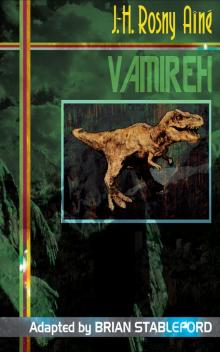 Vamireh
Vamireh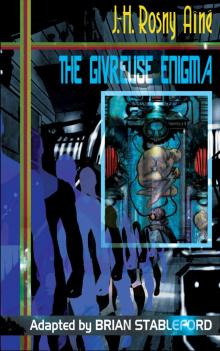 The Givreuse Enigma
The Givreuse Enigma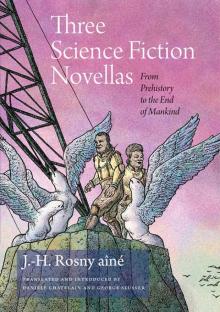 Three Science Fiction Novellas: From Prehistory to the End of Mankind
Three Science Fiction Novellas: From Prehistory to the End of Mankind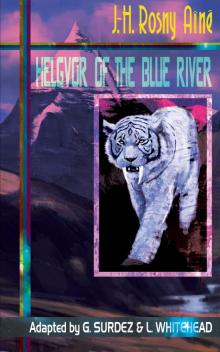 Helgvor of the Blue River
Helgvor of the Blue River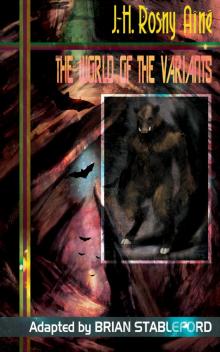 The World of the Variants
The World of the Variants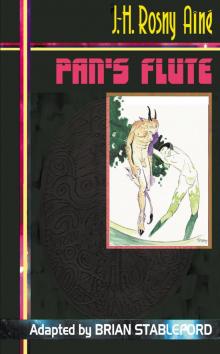 Pan's Flute
Pan's Flute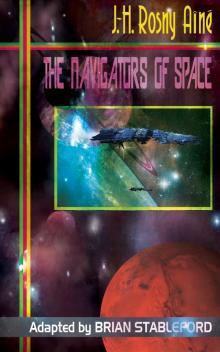 The Navigators of Space
The Navigators of Space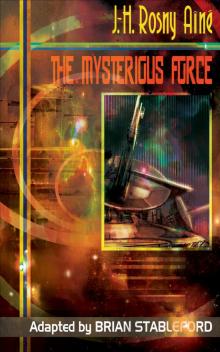 The Mysterious Force
The Mysterious Force